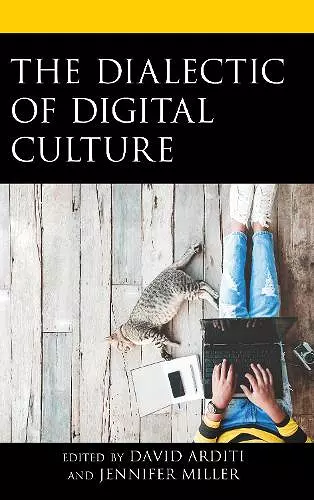The Dialectic of Digital Culture
Jennifer Miller editor David Arditi editor
Format:Paperback
Publisher:Bloomsbury Publishing PLC
Published:18th Oct '21
Currently unavailable, and unfortunately no date known when it will be back
This paperback is available in another edition too:
- Hardback£90.00(9781498589864)

This edited collection analyzes the role of digital technology in contemporary society dialectically. While many authors, journalists, and commentators have argued that the internet and digital technologies will bring us democracy, equality, and freedom, digital culture often results in loss of privacy, misinformation, and exploitation. This collection challenges celebratory readings of digital technology by suggesting digital culture's potential is limited because of its fundamental relationship to oppressive social forces.
The Dialectic of Digital Culture explores ways the digital realm challenges and reproduces power. The contributors provide innovative case studies of various phenomenon including #metoo, Etsy, mommy blogs, music streaming, sustainability, and net neutrality to reveal the reproduction of neoliberal cultural logics. In seemingly transformative digital spaces, these essays provide dialectical readings that challenge dominant narratives about technology and study specific aspects of digital culture that are often under explored.
Check out the blog for more: http://blog.uta.edu/digitaldialectic
With a nod to Max Horkheimer and Theodor W. Adorno's classic work of critical cultural studies, Dialectic of Enlightenment (1944), in the title, this volume similarly seeks to challenge Enlightenment assumptions, namely that the embrace of science and technology results in human freedom, democratization, and social progress. Applying the critique and methodology of Horkheimer and Adorno's work on Enlightenment thinkers to postmodern ramifications of digital culture in the 21st century, editors Arditi and Miller (both, Univ. of Texas, Arlington) ably set the stage for 12 provocative essays in their introduction by outlining a dialectic approach to digital technology. An even balance is achieved through four sections organized by theme: power, politics, culture, and humanity; each section has three essays. The authors tackle the promise of technology to promote social justice and the contradictions or paradoxes that arise in practice, often outside the awareness of users. They also address thorny digital-era concepts such as net neutrality, streaming, and privacy with analytical insight and often a dose of editorializing that is critical of government and corporate interests in and control of technology.
Summing Up: Recommended. Upper-division undergraduates through faculty.
Arditi and Miller wrap some excellent essays with an introduction and conclusion centering on Frankfurt School dialectical theory and the emergence of the digital disaster. The core of the book deals with the idea of a digital dialectic and its analysis in chapters on power, politics, culture, and being human. The editors have lined up a stellar group of essays that profoundly engage our digital world and the edges between questions of music, economy, ecology, memes, and related topics. The dialectical nature of the analyses provides both an entryway and unity to the essays. The book makes numerous substantive contributions to several fields and is worth a read for its scholarship and for those building a knowledge base about our contemporary digital world. -- Jeremy Hunsinger, Wilfrid Laurier University
In The Dialectic of Digital Culture, Arditi and Miller have assembled a fascinating collection of essays exploring the promise and peril of contemporary digital culture. Insisting that we think about digital media dialectically—as both empowerment and capture—the authors collectively inspire readers to pierce through facile narratives of progress and to think more critically about their relationship to digital technologies. Readers will also find the rich diversity of technologies, platforms, practices, and case studies covered in this book to be engaging and enlightening. This is required reading for students and scholars of digital culture. -- Timothy A. Gibson, George Mason Univer
ISBN: 9781498589888
Dimensions: 219mm x 154mm x 17mm
Weight: 445g
260 pages